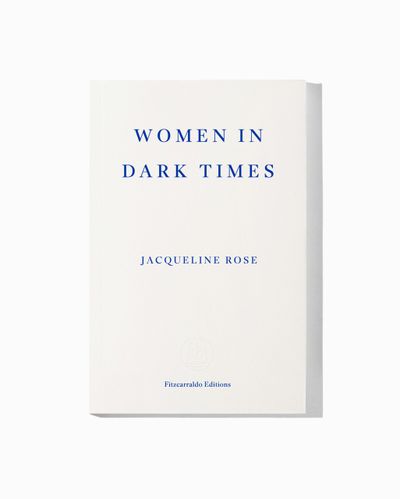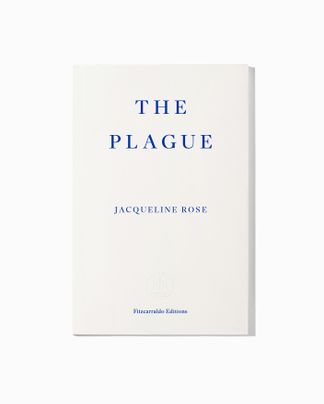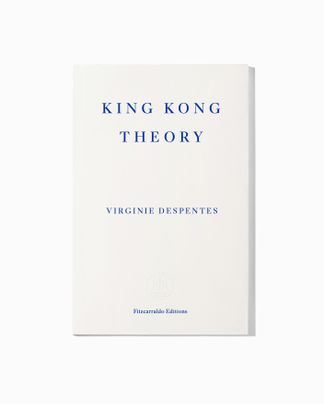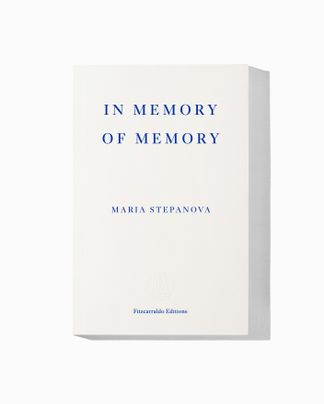Women in Dark Times begins with three remarkable women: revolutionary socialist Rosa Luxemburg; German-Jewish painter Charlotte Salomon; and film icon Marilyn Monroe. The story of these women, bound together by their struggles against iniquity, blazes a trail across some of the defining features of the twentieth century – revolution, totalitarianism and the American dream – and compels us to reckon with the unspeakable. Bringing to the surface the subterranean depths of history and the human mind that dominant political vocabularies cannot bear to face, pioneering critic and public intellectual Jacqueline Rose forges a new language for feminism. Extending her argument into the present, Rose turns her focus to ‘honour’ killings and celebrates contemporary artists whose work grows out of an unflinching engagement with all that is darkest in the modern world. Women in Dark Times, reissued a decade after its original publication, offers a template for a scandalous feminism, one which confronts all that is most recalcitrant and unsettling in the struggle to create a better world.

Women in Dark Times
French paperback with flaps, 416 pages
Published 27 February 2025
Women in Dark Times
0
INTRODUCTION
‘Life being how it is, isn’t necessarily how it is.’
— Heshu Yones, killed by her father, London, 2003
‘It was the unpredictable in herself that she used.’
— Eve Arnold on Marilyn Monroe
This book begins with the story of three women who create their lives in the face of incredible odds. Whether they do so despite or because of those odds is a question which each of them embodies, a question they put as much to us as to themselves. It will also tell the story, more starkly, of the odds that women, in the worst of cases, can find themselves up against. For me, the three women are survivors, although the idea may at first glance seem strange, since each could also be said to have died before her time. They have everything to teach us about the complex reckoning – the traffic – between the cruelties of the heart and of the world. Each one belongs to the last century, in which prosperity and killing multiplied in ways previously unknown. In this book, death shadows the lives of women whose energy, whose fierce protest against the constraints and injustice of the modern world, is still exemplary today.
I see them as artists, women who etch words and images out of living history and their own flesh. One most obviously perhaps – she is famous in her own way, but for many might also be the least familiar: the German-Jewish painter Charlotte Salomon, who poured on to the page – over a thousand gouaches painted in an extraordinary rush of two years between 1940 and 1942 – the colours and musical notes of her epoch in combinations and shapes never seen before or since. But Rosa Luxemburg, with whom I begin, was also an artist – a wordsmith who wrote poems, as well as painting, and whose political speeches and letters sing as much as they exhort, cajole and proclaim. In her work, the revolutionary potential of the first decades of the twentieth century is gifted with a language painstakingly crafted to its task. And Marilyn Monroe, contrary to the dismissals or even mockery she so often attracts, is also, I argue, to be seen and respected as a consummate performer, a brilliant artiste in whose hands – or rather across whose body and face – the dreams of Hollywood, in a post-war America straining under the weight of its own ideals, receive their most thorough and ultimately tragic exposure.
All three are therefore truth-tellers who lay bare the ugly secrets of the consensus, the way of the world which the corrupt, powerful and over-privileged in the West never stop telling us – no more so than now – is the only way that the world must and always will be. The fact that they are women is key. If one of my aims in this book is to add their names to the already distinguished ancestry, the foremothers, of modern feminism, it is not because they saw themselves as feminists – they did not – but because I believe that each one of them, in the way they understood and negotiated the perils of their lives, has something urgent to say to feminism today. One thing they have in common is their suffering. But if each of them is stricken, they also make themselves the subjects of their own destiny (destiny as distinct from fate, which condemns all its players in advance). Each of them trawls the darkness of their inner life, where their own most anguished voices reside, in order to understand what impedes them but also in search of the resources to defy their own predicaments. If they attract me so deeply, it is because not one of them makes the mistake – as I see it – of believing that effective existence in the real world must come at the expense of the most painful forms of self-knowledge. Subject to violence, they also take their lives into their own hands. They are never – any of them – solely the victims of their history, even if that history finally kills them.
Luxemburg begins the story. A Jewish woman born in Poland, she rose up the highest echelons of German socialist circles to become one of the most outspoken revolutionary voices of the early twentieth century. She was exceptionally versatile: revolutionary Marxist, propagandist, teacher and speaker; stylist and rhetorician; lyricist and word-artist; translator and linguist; painter and botanist; and, as I recently discovered, a passionate cyclist (together with Edith Cavell, who is famous as a nurse but less as a socialist, she participated in a six-day cycling event at Dieppe in the summer of 1902). Enthusiast of the 1905 and then 1917 Russian revolutions, she was the uncompromising detractor of her colleagues in the German Social Democrat Party, whose betrayal of revolution reached its crisis for her when they supported the munitions bill which heralded the start of the 1914–18 war. Frequently imprisoned – for insulting the Kaiser and then for her opposition to that war – she was murdered by government henchmen in 1919 after the failed Spartacist revolutionary uprising. The brutal suppression of that revolution has consequences still with us to this day. It was a moment of truth when ruined, defeated soldiers were able fleetingly to glimpse that they had been the victims of a capitalist, imperialist war which had put the workers of the world at each other’s throats. ‘Socialism or barbarity’ was Luxemburg’s famous slogan. After her death, barbarity would of course triumph. Out of the Freikorps that killed her would emerge some of the most fervent future supporters of Hitler.
When Luxemburg steps on to the public stage for the first time, launching what will be a brilliant career of public speaking, she slowly but surely takes the measure of her own power. ‘Not that I am all fired up and bursting with enthusiasm,’ she writes from Berlin to her grudgingly appreciative lover, Leo Jogiches, in 1898. ‘On the contrary I am quite calm and look to the future with confidence … I am sure that in half a year’s time, I will be among the best of the party’s speakers.’ The voice, the effortlessness, the language – everything, she writes to him, ‘comes out right’, as if she had been speaking for twenty years (she is twenty-eight at the time). Luxemburg is collecting herself, finding her voice in what is of course essentially a man’s world. A small, Polish-Jewish woman with a limp, she is – metaphorically but also literally – drawing herself up to her full height. She will be the equal of every man she addresses, and more than the equal of the many male revolutionary pundits and stars, including Lenin, whom she will take to task in the course of her life.
Quite simply, she conquers their world. At the same time, she has no doubt that what she brings to that world is uniquely her own. ‘Do you know what I have been feeling very strongly?’ she writes to Jogiches a few months later. ‘Something is moving inside me and wants to come out … In my “soul” a totally new, original form is ripening that ignores all rules and conventions. It breaks them by the power of ideas and strong conviction. I want to affect people like a clap of thunder, to inflame their minds not by speechifying but with the breadth of my vision, the strength of my conviction, and the power of my expression.’ Fiery, intemperate, ruthless – Luxemburg could be all of these. But for Luxemburg, to be a political actor in the world is to usher into that world something as unpredictable as a new birth. Then she adds: ‘How? What? Where? I still don’t know.’ Appearances can be deceptive. Luxemburg’s hesitancy is the backdrop, the indispensable companion of her poise. She is calling for a new language of politics, one which today is still met mostly with incomprehension or intolerance: a political vision that will not try to extinguish what cannot be controlled in advance or fully known. In this she is profoundly in tune with Hannah Arendt – from whose book Men in Dark Times I take my title – who, writing of totalitarian terror, describes the ultimate freedom as identical with the capacity to begin. Over such beginnings, she writes, ‘no logic, no cogent deduction can have any power because the chain presupposes, in the form of a premise, a new beginning’. It is therefore each new birth that totalitarianism hates. Terror is needed ‘lest with the birth of each new human being a new beginning arise and raise its voice in the world’.
Raising a voice in the world would of course be one definition of feminism – speaking out, protesting, clamouring loudly for equality, making oneself heard. ‘Find your voice and use it’ was recently described as the first lesson feminism has to learn from the suffragettes. Mary Beard has recently spoken publicly of the high price women pay for being heard. Patriarchy has been very efficient in countering the noise of feminism with epithets – ‘shrill’, ‘hysterical’ – intended to send women’s voices scurrying back, abject, underground. The famous backlash against feminism is, we could say, not just aimed at restoring the ascendancy of men in the material world, but also, and no less forcefully, directed at women’s speech. An outspoken woman is a threat, not just because of the content of what she says, the demands she is making, but because, in the very act of speaking, her presence as a woman is too strongly felt. Drawing language up from inside her, she makes the body as the source of language too palpable in her person, giving the lie to the delusion that the body is sublimated in our utterances, that we can hide our mortal flesh behind the words that we speak. On this, Luxemburg’s opponents were unapologetic. August Bebel, self-proclaimed feminist, wrote of her ‘wretched female’s squirts of poison’; Viktor Adler called her a ‘poisonous bitch … clever as a monkey’. On another occasion he more simply complained that she had ‘proved herself too much of a woman’. ‘We will hang her,’ he is reported as saying half jokingly after the 1905 Social Democratic Party in Jena. ‘We will not allow her to spit in our soup.’ Women who speak out threaten and expose the limits of the human: vile liquid, animal, or both.
(…)
‘A surfeit of elegance and intelligence.’
— Ali Smith
‘It’s really hard for me to overestimate how important [Rose’s] work has been for me…. I don’t feel like that about very many writers.’
— Maggie Nelson
‘Jacqueline Rose has no peer among critics of her generation. The brilliance of her literary insight, the lucidity of her prose, and the subtlety of her analyses are simply breathtaking.’
— Edward Said
‘One of the most original and intellectually sophisticated minds at work today.’
— Eimear McBride
‘As a literary scholar and psychoanalytic thinker, Rose has long insisted that we pay close attention to the subterranean fears, fantasies, and narratives that structure our most pressing sociopolitical problems.’
— Merve Emre, The Nation
‘To read Rose is to understand that there is no border between us and the world; it is an invitation to a radical kind of responsibility.’
— Parul Sehgal, New York Times
‘A rigorously argued and at times breathtaking book. Many paragraphs contain a controlled explosion; her analysis of men’s fear of and fascination with female sexuality, born from the boy’s early proximity to the mother’s body, is one of them. The book closes with a clarion cry: “Women have been reasonable for far too long.” Her reasoning, ironically, is as tight and sinuous as a constrictor knot. It is a time to be afraid of the dark.’
— Frances Wilson, Daily Telegraph
‘The kind of restless and confrontational thinking of Women in Dark Times’s feminism is essential, yet it is up against a vast apparatus of material power opposed to letting it take root. For all its interest in the darkness of our minds, the feminism of Women in Dark Times seems profoundly hopeful and generative, always leaving the gap between who a person is and who they can be. Transformation is always possible…. It may be easy to deem the exploration of one’s inner life as privileged navel-gazing, but Rose’s scandalous feminism takes that as a basis to create a new world: one that puts our vulnerability at its very core.’
— Rebecca Liu, ArtReview
‘Jacqueline Rose is one of our most stimulating public intellectuals. This is the book we have been waiting for, a clarion call for us all, men and women, to be bolder and brasher in our advocacy for change but also more willing to embrace our contradictions.’
— Helena Kennedy QC
‘Formidable…. It is impossible not to listen carefully to what Professor Rose has to say in her thought-provoking, rigorously argued writing on feminism, literature and psychoanalysis…. It is a breathtaking book and a challenging read – ambitious, scholarly and innovative.’
— Herald
‘Jacqueline Rose’s book Women in Dark Times is pretty amazing.’
— Irvine Welsh
‘Rose confronts dark times with dark and moving stories from the last century inspiring a new feminism for this one. By so doing she keeps alive the dreams of so many women from Rosa Luxemburg and Marilyn Monroe to young girls killed in the name of some perverted sense of “honour”. Most likely a classic.’
— Shami Chakrabarti, Director of Liberty
‘Women in Dark Times follows a long-established trajectory within her work, questioning assumptions and reframing debates from an explicitly feminist perspective. Rose’s text is intersectional in the best sense of the word, combining many approaches – including, but not limited to, concerns over gender, race, Jewish identity and politics. Linking all of these together is psychoanalysis, whose revelations allow for the demystifying and revisionist readings at the core of the book. Demonstrates the value of scholarly reappraisals of cultural figureheads.’
— Jewish Quarterly
‘This is not an easy book but a lucid, deeply absorbing and strangely soothing one.’
— New Statesman
‘The book provides a valuable record of the ideologies and achievements of women whom society would rather have kept silent.’
— Independent
‘Rose’s thesis is a measured and decisive stroke in contemporary feminist theory.’
— Financial Times
‘Jacqueline Rose is a pioneering feminist and a fine storyteller…. We need to listen carefully to Rose’s call in this inspiring and reflective book for a new “scandalous” feminism.’
— Rachel Holmes, Literary Review





